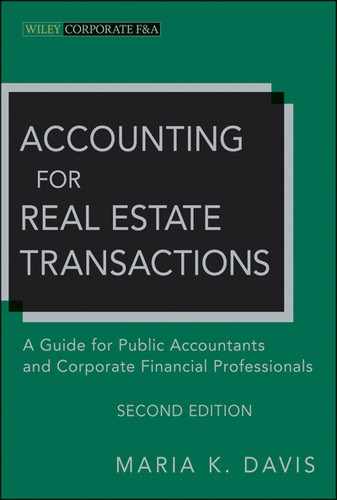Preface
What is real estate? Land and structures, brick and mortar to some, a bundle of rights and obligations to others. Real estate can be sold outright or it can be securitized. Investors can buy real estate properties or invest in real estate investment trusts. The many facets of real estate and the size of the real estate market—trillions of U.S. dollars in the United States alone—make it so intriguing.
The past few years were marred by a global financial crisis and depressed real estate markets throughout the United States. Homebuilders let real estate purchase options expire; homeowners walked away from their homes or lost them in foreclosures; and corporate investors handed the keys to commercial real estate properties to the lenders that had granted loans on a nonrecourse basis.
Accounting for Real Estate Transactions addresses accounting issues that have become prevalent in the wake of the crumbling real estate markets, such as impairment and consolidation considerations for special-purpose entities. It is a comprehensive reference guide that provides financial professionals with a tool to evaluate the accounting consequences of specific deals, enabling them to structure transactions with the accounting consequences in mind and to account for them in accordance with U.S. GAAP. It helps members of audit committees and oversight boards better understand the applicable accounting literature, assess the proper application of the accounting rules, and evaluate the conclusions reached by their companies' management.
The book is divided into two parts:
![]() Part I of Accounting for Real Estate Transactions explains the rules governing a variety of real estate transactions applicable to companies of all industries, the acquisition and development of real estate properties, real estate sales and exchanges, and lease and sale-leaseback transactions.
Part I of Accounting for Real Estate Transactions explains the rules governing a variety of real estate transactions applicable to companies of all industries, the acquisition and development of real estate properties, real estate sales and exchanges, and lease and sale-leaseback transactions.
![]() Part II of the guide covers accounting for interests in real estate ventures, time-sharing transactions, and retail land sales, which are specific to companies operating in the real estate industry.
Part II of the guide covers accounting for interests in real estate ventures, time-sharing transactions, and retail land sales, which are specific to companies operating in the real estate industry.
Accounting is not static. New revenue and leasing standards are on the horizon—both are joint projects of the Financial Accounting Standards Board and the International Accounting Standards Board, and both standards will replace a myriad of rules under U.S. Generally accepted accounting principles (GAAP). The accounting for financial instruments is being overhauled, and fair value measurement is expected to increase in importance. This guide will be updated periodically to reflect new authoritative guidance and address emerging issues faced by practitioners.
Readers are welcome to provide feedback and input on accounting issues they believe are prevalent and should be addressed in this guide; these issues will be considered for inclusion in future editions.
I wish to sincerely thank my husband, Richard, and my family for their continual encouragement, and all of the friends and professionals who provided comments and suggestions during the research, writing, and production process.
Maria Davis
Washington, DC
December 2011
